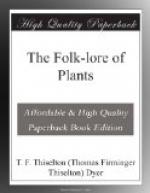There are many proverbs associated with the oak. Referring to its growth, we are told that “The willow will buy a horse before the oak will pay for a saddle,” the allusion being, of course, to the different rates at which trees grow. That occasionally some trifling event may have the most momentous issues is thus exemplified:—
“The smallest axe may fell the largest oak;”
Although, on the other hand, it is said that:—
“An oak is not felled at one chop.”
A further variation of the same idea tells us how:—
“Little strokes fell great oaks,”
In connection with which may be quoted the words of Ovid to the same effect:—
“Quid magis est durum saxo?
Quid mollius unda?
Dura taneu molli saxa cavantur aqua?”
Then, again, it is commonly said that:—
“Oaks may fall when seeds brave the storm.”
And to give one more illustration:—
“The greatest oaks have been little acorns.”
Similarly, with trees in general, we find a good number of proverbs. Thus one informs us that “Wise men in the world are like timber trees in a hedge, here and there one.” That there is some good in every one is illustrated by this saying—“There’s no tree but bears some fruit.” The familiar proverb, that “The tree is no sooner down but every one runs for his hatchet,” explains itself, whereas “The highest tree hath the greater fall,” which, in its moral application, is equally true. Again, an agricultural precept enjoins the farmer to “Set trees poor and they will grow rich; set them rich and they will grow poor,” that is, remove them out of a more barren into a fatter soil. That success can only be gained by toil is illustrated in this proverb—“He that would have the fruit must climb the tree,” and once more it is said that “He who plants trees loves others beside himself.”
In the Midland counties there is a proverbial saying that “if there are no kegs or seeds in the ash trees, there will be no king within the twelvemonth,” the ash never being wholly destitute of kegs. Another proverb refers to the use of ash-wood for burning:—
“Burn ash-wood green,
’Tis a fire for a queen,
Burn ash-wood dear,
’Twill make a man swear;”
The meaning being that the ash when green burns well, but when dry or withered just the reverse.
A form of well-wishing formerly current in Yorkshire was thus:—
“May your footfall be by the root of an ash,”
In allusion, it has been suggested, to the fact that the ash is a capital tree for draining the soil in its vicinity.
But leaving trees, an immense number of proverbs are associated with corn, many of which are very varied. Thus, of those who contrive to get a good return for their meagre work or money, it is said:—
“You have made a long harvest for a little corn,”




